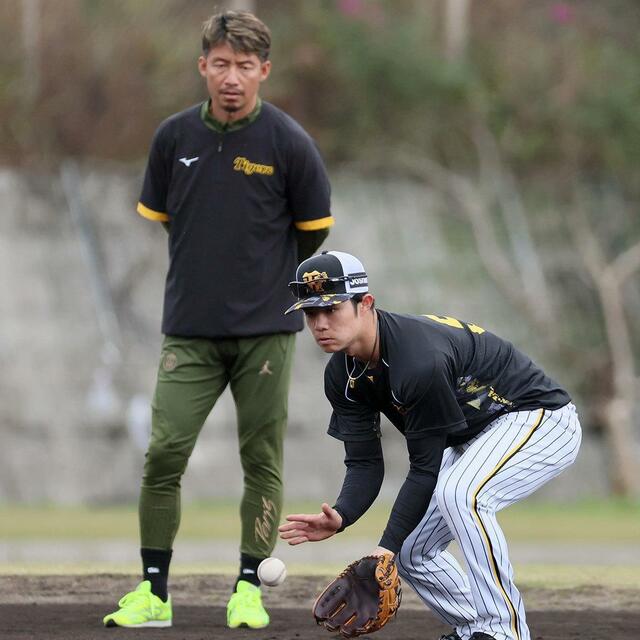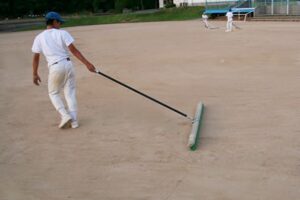
There are various ways to practice baseball, but the “pepper game” is one of the oldest practices.
However, some people say that the pepper game is meaningless.
What is the reason behind this opinion?
In this article, we will take a closer look at the basic rules and history of the pepper game, as well as its purpose and role.
We will also introduce criticism of the Pepper Game and research results on its effectiveness, and clarify the advantages and disadvantages of the Pepper Game.
In addition, we will look at alternative training methods for the pepper game, effective ways to incorporate it, and the opinions of players and coaches, to get to the truth about the pepper game from a comprehensive perspective.
So, let’s start by looking at what the pepper game is, its basic rules and history.
目次
What is Pepper in Baseball?
The pepper game is one of the baseball practice exercises, and is often used as a warm-up.
The game is considered an effective way for players to develop quick reactions and precise technique.
Below we will go into detail about the basic rules of the pepper game as well as its history and origins.
Basic Rules of the Pepper Game
The Pepper Game is a simple yet effective practice method.
The game proceeds as follows:
1. Player Arrangements
A pepper game is usually played with one batter and three to five fielders. The batter stands facing the pitcher, and the fielders are positioned in a circle or semicircle in front of the batter.
2. Hitting the ball
One of the fielders throws a ball lightly to the batter. The batter hits the ball lightly and sends it to the fielder. The batter does not hit it hard, but with a controlled swing, aims the ball at the defender.
3. Fielder Movement:
A fielder catches the ball and immediately throws it to the next fielder. By repeating this process, fielders practice quick reactions and accurate catching and throwing.
4. Substitution and Continuation
After a certain amount of time has passed or after a batter has taken a certain number of hits, the batter and fielder roles are switched. This allows everyone to practice both batting and fielding.
History and Origin of the Pepper Game
The pepper game is a training method that has been used for a long time in baseball history.
There are no accurate records of its origins, but it is said to have become widely practiced in the early 20th century.
1. Early Pepper Games
The pepper game began as a simple practice method used by early professional baseball players to warm up and refresh themselves. The game became popular among players because it required little equipment and could be easily played anywhere.
2. Popularization of the Pepper Game
Due to its simplicity and effectiveness, the Pepper Game has become widely adopted in amateur baseball, high school baseball, and even Little League. In the United States in particular, many teams have incorporated the Pepper Game as part of their daily practice menu.
3. The role of the pepper game in modern
baseball In modern baseball, the pepper game is mainly played to warm up and refresh. Some coaches and players appreciate that the pepper game is useful for practical defensive practice and team building. On the other hand, there are also opinions that do not place much importance on the pepper game because there is a tendency to emphasize more advanced techniques and tactics.
The Pepper Game continues to be a popular basic baseball training tool due to its simplicity and diverse training effects.
Through this, players can hone their basic skills and develop a sense of unity as a team.

The purpose and role of the Pepper Game
The pepper game serves many purposes and functions as a baseball practice menu.
In this section, we will go into more detail about Pepper as part of your practice and its importance in team building.
Pepper as part of practice
Pepper games are an effective way for players to master basic skills and improve reaction speed.
1. Skill Development
The Pepper Game is a practice to strengthen basic skills such as batting, fielding and throwing. Batters learn precise bat control by hitting the ball lightly. Meanwhile, fielders improve their defensive techniques by repeatedly practicing quick reactions and accurate catching and throwing.
2. Improved reaction speed
The pepper game is very effective in training players’ reaction speed. The ball moves quickly between the batter and the fielder, so players must react instantly. This improves reaction speed in real games, allowing players to play quickly and accurately in defense and batting.
3. Warm-up
Pepper games are also a good way to warm up before a match or practice. Through light exercise, players can loosen their muscles and warm up their bodies. This helps prevent injuries and prepares them for the match.
4. Improve mental concentration
Pepper games also have the effect of improving players’ concentration. Through short, repetitive practice, players can concentrate on their play and develop their attention. This allows them to calmly handle pressure during a match.
The Importance of Pepper in Team Building
Pepper games not only help improve individual skills, but also increase unity throughout the team.
1. Strengthening teamwork
Pepper games promote communication and cooperation between players. In order to handle the ball quickly and accurately, players need to trust each other and coordinate their timing. This strengthens the bond between players and improves the performance of the entire team.
2. Improve communication skills
Through Pepper Games, players naturally start to communicate with each other. By giving instructions to each other and encouraging each other, communication skills improve and teamwork during the game becomes smoother.
3. Maintaining motivation
Pepper games as a fun practice have the effect of increasing players’ motivation. Because it is done in a game-like manner, players can practice while having fun, which leads to maintaining long-term motivation.
4. Creating a team atmosphere
Pepper games also have the effect of easing the team atmosphere. By playing in a relaxed state, players’ stress can be reduced and practice can be carried out in a relaxed atmosphere. This can ease tension and improve team morale.
Pepper games are extremely effective not only for improving skills and warming up, but also as a team-building tool.
By incorporating this type of training, players can improve not only their skills, but also their mental toughness and team cohesion.

Is the Pepper Game really meaningless?
There is mixed opinion on the effectiveness of pepper games.
While some coaches and players have voiced criticism, there are also many who support its effectiveness.
Here we take a closer look at the criticisms of pepper games, why they are being criticized, and the research into their effectiveness.
Criticism of the Pepper Game and its reasons
Pepper games have been criticized by some in the baseball world for the following reasons:
It has been pointed out that the pepper game has many differences from the movements and plays required
in an actual game. Some say that it is difficult to replicate the pressure and speed of a game with light batting and short-distance throwing, and therefore cannot be considered a realistic practice.
2. Risk of injury
Playing at a short distance and at a fast tempo can pose a risk of injury. In particular, there is concern that injuries to the hands and fingers may occur due to strong hits at close range and sudden movements. For this reason, some coaches avoid the pepper game.
3. Limited skill acquisition
Pepper games mainly focus on basic catch ball and light batting. Therefore, it has been criticized that it is not suitable for practicing the complex skills and tactical plays that players need. In particular, it is sometimes said to be insufficient for training advanced defensive skills and throwing power.
Research on the effectiveness of pepper games
On the other hand, pepper games have been shown to have some benefits, and there is research and opinion to support this.
1. Strengthening Fundamental Skills
Pepper games are considered a good way for players to hone their fundamental skills. They help improve batting accuracy and fielding reaction times. These fundamental skills are important for players at any level.
2. Mental refreshment
Pepper games are effective as a warm-up before a match or practice. Since players can play while relaxing, it also leads to mental refreshment. It also has the effect of easing the atmosphere of the entire team and increasing concentration during practice.
3. Team Building
Pepper games are also effective as part of team building. They promote communication between players and increase the cohesion of the entire team. They are especially useful as a tool to build trust between young players and new teammates.
4. Dynamic warm-up
Research has shown that pepper games are effective as a dynamic warm-up and can help prevent injuries by loosening players’ muscles. Many teams use them because they can warm up the body efficiently in a short amount of time.
Opinions are divided on the effectiveness of pepper games, but in order to determine their value, it is important to incorporate them appropriately based on the needs of your team and players.
While there is much criticism, some also acknowledge its usefulness in certain situations, such as improving basic skills and team building.

Advantages and Disadvantages of Pepper Game
While the pepper game is widely used as a baseball practice tool, there are differing opinions on its effectiveness.
Here we will explain in detail the advantages and disadvantages of pepper games.
Benefits of Pepper Game
1. Improving basic skills
The Pepper Game is effective in improving players’ basic skills. It can train batting control and quick fielding reactions. This allows players to acquire the basic skills required in a real game.
2. Dynamic Warm-up
Pepper games are an ideal warm-up before a match or practice. Light exercise helps players warm up their muscles and prevent injuries. Dynamic warm-ups also help increase muscle flexibility and prepare the body for the match.
3. Promoting communication
Pepper games promote communication between players. By practicing together with teammates, it becomes easier to understand each other’s playing styles and movements, which makes teamwork during the game smoother. This increases team cohesion.
4. Mental Refreshment
The Pepper Game is also a fun way for players to practice. By treating it like a game, players can relax and have fun while practicing. This helps them to refresh their minds and increases their motivation to practice.
Disadvantages of Pepper Game
1. Lack of practical training effect
Pepper games are criticized for lacking practical training effect because it is difficult to reproduce the situations and pressures required in an actual game. In particular, it is sometimes said to be insufficient for honing advanced skills such as powerful hitting and long-distance throwing.
2. Risk of injury
Because pepper games require short-distance, fast-paced play, there is a risk of unexpected injury. In particular, injuries to the hands and fingers can occur due to strong hits at close range or sudden movements. For this reason, it is necessary to play with care.
3. Limited skill acquisition
Pepper games mainly focus on basic catch ball and light batting. Therefore, it has been criticized that it is not suitable for practicing the complex techniques and tactical plays that players need. In particular, it is insufficient for training advanced defensive techniques and throwing power.
4. It’s hard to maintain motivation
Some players and coaches find pepper games monotonous and boring. Especially for advanced players, who tend to seek more practical and challenging training methods, pepper games alone can make it difficult to maintain motivation.
While pepper games have many benefits, it is also true that they have limitations in terms of providing practical practice or acquiring advanced skills.
Therefore, to effectively use pepper games, it is important to combine them with other practice methods.
This will help improve the overall skills of the players.

Alternative Pepper Game Practice
While the pepper game helps hone basic skills, modern baseball demands more effective training methods and practical defensive drills.
Here we will introduce some modern training methods and practical defensive drills that are alternatives to the pepper game.
Modern training methods
Modern baseball training incorporates a scientific approach and the latest technology.
This allows players to improve their skills more efficiently.
1. Biomechanics Training This
is a training method that applies the principles of biomechanics to analyze and optimize players’ movements. Throwing and batting movements are filmed with a high-speed camera to identify areas for improvement in form. This allows players to learn efficient movements without waste.
2. Virtual Reality (VR) Training:
VR technology is being used to simulate real-life match situations. Players can wear VR headsets and practice in a realistic match environment, giving them a sense of real-life match play. This improves their ability to remain calm in pressure situations.
3. Strengthening physical training
Strength training and endurance training are used to strengthen the muscles of the entire body. In particular, strengthening the lower body and core training are important. This allows for agile movements and powerful throwing. Stretching and yoga are also used to improve flexibility.
4. Psychological Training
This is training that utilizes sports psychology to strengthen the mental aspects of players. Meditation to improve concentration and mental rehearsal to deal with pressure are conducted. This allows players to reduce tension during the game and maintain a calm play.
Introduction to practical defensive training
Practical defensive drills are important for honing the skills to respond to the specific situations required in a match.
Here are some effective ways to practice:
1. Simulation Drills
These drills simulate various defensive situations that occur in real games. For example, we practice double plays, bunt handling, catching the ball near the fence, and other specific plays. This allows players to acquire the skills to remain calm during games.
2. Rebound Net Practice This
practice uses a rebound net to handle unpredictable bouncing balls. Players improve their fielding reaction speed and accuracy by reacting quickly and accurately to the ball bouncing off the net.
3. Partner Drills
Defensive drills are done in pairs. One player hits the ball and the other plays defense. This allows players to develop real-time judgment and reaction skills. Also, by communicating with their partner, teamwork is strengthened.
4. Live BP (batting practice)
This is batting practice against a real pitcher. The pitcher will pitch as if in a real game, and the batter will hit against it. Through this practice, the batter can improve their batting skills in a situation close to a game.
By incorporating these modern training methods and practical defensive drills, players can effectively develop the skills and fitness to play at a higher level.
By combining this with the Pepper Game, you can improve your overall skills.

How to Use Pepper Games Effectively
Pepper games are effective for honing basic skills and strengthening teamwork.
However, to get the most out of it, some ingenuity and arrangement is required.
Here we will explain how to incorporate pepper games effectively.
Pepper Game Ideas and Arrangements
We will introduce some ideas and arrangements to make the Pepper Game not just a basic practice, but a more practical and enjoyable practice.
1. Introducing a variety of scenarios
By introducing realistic scenarios into the Pepper Game, players can improve their ability to apply the game. For example, by simulating situations with runners on base or plays in specific defensive positions, players can acquire skills to respond to more practical situations.
2. Adjusting speed and tempo
By increasing the tempo of the game, you can improve the reaction speed of the players. Also, by incorporating slower tempo training that emphasizes accuracy at times, you can balance the players’ skills. By adding a change of tempo, you can keep the players focused without getting bored.
3. Rotate players: By frequently rotating between
batter and fielder roles, you allow everyone to practice a variety of skills. This allows all players to develop a balanced set of batting, fielding, and throwing skills.
4. Introducing a point system
By introducing a point system, you can increase the motivation of your players by adding a sense of gameplay. For example, you can give points for accurate plays or quick reactions, creating an environment where players can practice in a fun way while stimulating their competitive spirit.
Frequency and timing of pepper games
The frequency and timing of pepper games are key to their effectiveness.
By doing it at the right frequency and timing, you can get the most out of your practice.
1. Warm-up before practice
Pepper games are very effective as a warm-up before practice. Light exercise warms up the muscles and makes the body easier to move, which helps prevent injuries during practice. It is also effective as a mental refresher, helping to improve the players’ concentration.
2. Regular implementation
By regularly implementing pepper games, you can maintain and improve your basic skills. By implementing it 2-3 times a week, players’ skills will become more stable and the defensive ability of the entire team will improve. It is especially effective to incorporate it as a menu on days when there are no games or on light practice days.
3. Refresh before the match
Playing a pepper game before the match can help relieve tension and relax the players. By doing light exercise for a short period of time, you can prepare for the match and improve your concentration.
4. Cooling down after practice
It is also effective to incorporate pepper games as a cool-down at the end of practice. Through light exercise, you can loosen the muscles used during practice and promote fatigue recovery. This will refresh your body for the next practice or game.
To incorporate pepper games effectively, it is important to consider the appropriate ingenuity and arrangement, as well as frequency and timing.
This not only improves the players’ basic skills, but also increases teamwork and motivation.

Players and coaches’ opinions on the Pepper Game
Professional players and coaches have differing opinions about the pepper game.
Understanding their perspective can help us gain a deeper insight into the nature and effectiveness of pepper games.
Professional players’ views on the pepper game
Some professional players praise the pepper game, while others are skeptical.
1. Maintaining and improving skills
Many professional players believe that pepper games are useful for maintaining and improving basic skills. In particular, many players feel that they are effective in training batting control and fielding reaction speed. It is said that by incorporating pepper games into daily practice, basic skills can be improved.
2. Refreshing and warming up
The pepper game is also useful as a way to refresh and warm up before a match or practice. Professional players sometimes use this game to improve their concentration while doing some light physical exercise. By refreshing their mind, they can also increase their motivation for the match.
3. Critical Opinions
On the other hand, some professional players have doubts about the effectiveness of Pepper Game in practical games. In particular, some players feel that it is insufficient to reproduce the pressure and speed of a match. Some also believe that more practical practice is needed to hone advanced techniques and tactics.
Pepper Game from a Coach’s Perspective
Coaches are divided on the issue of pepper games.
We explore the benefits and challenges of pepper gaming from their perspective.
1. Acquiring basic skills
Many coaches believe that the pepper game is effective in helping players acquire basic skills. It is particularly valued as an excellent tool for teaching the fundamentals of batting and fielding to young players and beginners. It is considered to have high educational value as a simple and easy-to-implement training method.
2. Team Building
Some coaches consider pepper games to be part of team building. They are effective in promoting communication between players and strengthening teamwork as a whole. In particular, by incorporating them as a pre-match warm-up, you can expect to boost the morale of your players.
3. Lack of practical training
Some coaches point out that the pepper game is insufficient for practical training. They believe that more practical training methods are needed to hone the advanced techniques and tactics required in a match. Since relying too much on the pepper game can hinder the development of players, it is recommended to combine it with other training menus.
When we summarise the opinions of professional players and coaches about the pepper game, we can see that while this training method is effective in improving basic skills and refreshing the player, it has limitations in terms of practical training effectiveness.
To be effective, it is important to combine it in a balanced way with other practice methods.

![What is a hold point in baseball? [Comprehensive explanation]](https://planotatico.com/wp-content/uploads/2024/05/x7FsEohhygDF67yGDeyvJuSqDG0xdn42Sel6oUvu-min.jpeg)



